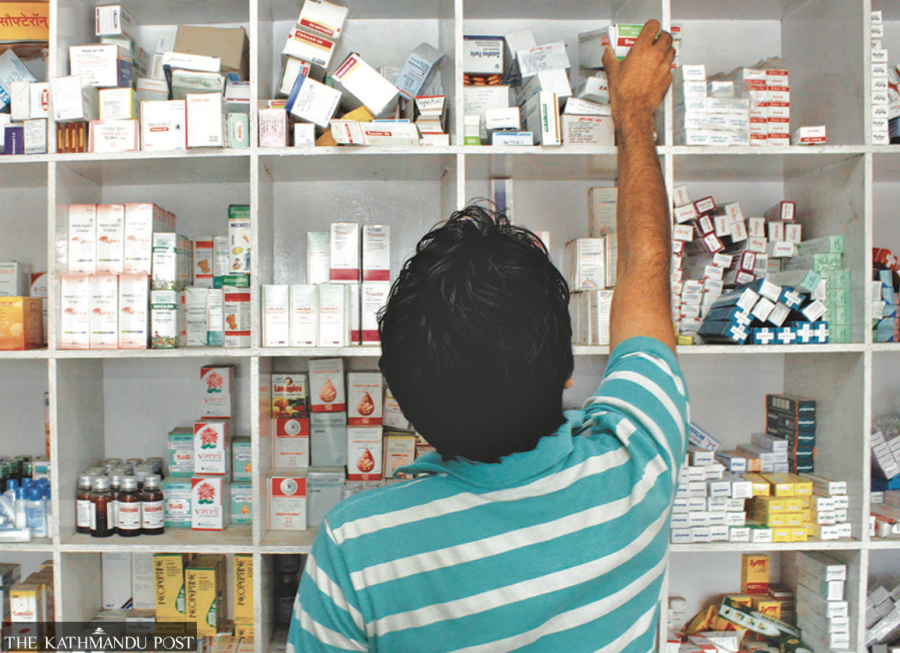Health
Agency on cards to check safety and efficacy of drugs and medical devices
Amid reports of prevalence of substandard medical equipment in the market, the Health Ministry has proposed forminga Food and Drug Administration.
Arjun Poudel
In May 2021, when the second wave of the Covid-19 pandemic was at its peak, a person from Kathmandu contacted a doctor at Danphe Care, an organisation that offered telemedicine service, for help.
The person told the doctor that the oxygen saturation level of his elderly father, who was infected with coronavirus, had dropped to 70. Doctors at the organisation suggested the person rush his father to the hospital immediately.
“We not only advised the person to take his father to the hospital but also tried our best to find a hospital bed and ambulance for him,” Dr Prabhat Adhikari, an infectious disease and critical care expert, told the Post. “But when the patient was taken to the hospital and was examined, the hospital’s pulse oximeter showed the oxygen saturation level was 95, meaning that the patient was normal.”
Health workers at the organisation said that the pulse oximeter at the patient’s home was faulty and showed low oxygen saturation in blood causing panic.
During the second wave of the pandemic that hit the country in April last year, health facilities designated for treatment of infected patients were overwhelmed with serious patients.
Hundreds of infected patients were forced to stay at home despite having complications as health authorities had appealed to the general people to seek treatment only if they become unconscious.
“People might have died at their homes as a result of faulty pulse oximeters that failed to show the critical condition of the patients,” said Adhikari. “If the oxygen saturation level in a patient’s blood had dropped to 40 but the pulse oximeter erroneously showed 90, then such patients could die at home without getting treatment,” he said, adding, “The problem has arisen because we don’t have a mechanism to check the quality of medical equipment including oximeters and blood pressure meters sold in the market.”
But government officials said the Ministry of Health and Population has been working to set up a new entity to control the quality of medical equipment.
“We have prepared a proposal for setting up the new entity, Food and Drug Administration,” Dr Ramesh Dhakal, Health Minister Birodh Khatiwada’s expert advisor, told the Post. “The proposed Food and Drug Administration will not only control the quality of equipment used in the healthcare sector but also control the quality of the nutraceuticals products, which are functional foods that contain health giving additives, that are prescribed by doctors.”
Most countries have dedicated agencies responsible for ensuring the safety, efficacy, and security of human and veterinary drugs, biological products, and medical devices among other things.
For example, there is the Food and Drugs Administration in the USA and neighbouring India has the India Central Drugs Standard Control Organization for this purpose.
Public health experts have been advocating for such an independent body.
During the Covid-19 pandemic, Nepali authorities purchased medical equipment worth millions of rupees. Several aid agencies and national as well as international organisations also donated equipment including ventilators. The Health Ministry accepts such equipment, without knowing their quality and many health facilities have been using those equipment.
Likewise, there is no agency in the country to monitor the quality of cosmetic products being sold in the market. Consumers have been using them without knowing their quality.
“The Department of Drug Administration regulates quality of the medicine and the agency under the Ministry of Agriculture and Livestock Developments gives permission to sell nutraceuticals,” said Mahendra Shrestha, former chief specialist at the Heath Ministry. “Nutraceuticals are being prescribed by doctors, and are being sold from dispensaries.”
Patients across the country are handed a long list of prescriptions of vitamin supplements while experts around the world still debate if vitamin supplements are just hype or of any help at all. Some doctors also prescribe vitamins even if the cause of ailments has not been established.
Patients also say they are forced to buy vitamin supplements, which most of the time are more expensive than regular drugs.
“In most cases patients do not need nutraceuticals,” said Dr Sagar Rajbhandari, former director at the Sukraraj Tropical and Infectious Disease Hospital. “An impression has been created that doctors prescribing more unnecessary nutraceuticals are more experienced and knowledgeable. When doctors prescribe those nutraceuticals patients will be forced to buy, without knowing if those nutraceuticals are needed or not.”
Experts the Post talked to said Nepal also needs a food and drugs regulatory body to address the anomalies in the market.
Officials at the Health Ministry said they are working to forward the draft proposal to the Cabinet for its approval. If approved by the Cabinet, it will be forwarded to parliament.




 13.16°C Kathmandu
13.16°C Kathmandu















